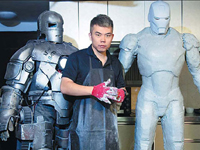Sparks of genius
The expo invited government officials, academicians from the Chinese Academy of Engineering, and more than 60 representatives from different industry and investment companies to visit.
Professionals in patent application and registration were also present, to guide the students in the application for patents and teach them all about copyrights.
Xia Qiang, deputy chairman of the Beijing Association for Science and Technology says that inventions from colleges cannot be ignored.
Related: 'Losers' can flatter themselves in any culture
On the contrary, universities have become an important source that fuels the transition of the economic mode for China.
But while inventions are booming in colleges, many have struggled to get noticed commercially.
"There are many innovation competitions around China, but we want to create a platform with a one-stop service to help the students connect with markets," Xia says.
In official statistics from 2006 to 2010, universities and colleges in Beijing obtained 13,000 patents, but only 240 were purchased and applied by markets, accounting for 1.8 percent of the total number.
"The inventions from college students are often seen as just spare time hobbies for competition or stepping stones for advancement in an academic career," says professor Zhang Zhonglian of the Beijing Institute of Technology.
"A medium is needed to transfer the college students' inventions to markets. The creative students are capable of inventing, but they lack necessary knowledge and opportunities to understand the market," Zhang says.
He said many teachers and students did not do relevant marketing evaluations before starting their programs, so their results do not meet practical needs.
"It costs around 3,000 yuan to apply for a patent, which is too costly for students.
"Besides, it usually takes about two years to get an invention patent, but the inventors may have graduated by then and abandoned their inventions."
On the other hand, the companies also lack information and patience to bring inventions of college students into their production plan.
"Many domestic enterprises believe that it is better to buy mature technology or imitate rather than burn money to experiment with new technology," says professor Qin Jianjun with Beijing University of Civil Engineering and Architecture.
Contact the writer at wangru@chinadaily.com.cn.


















